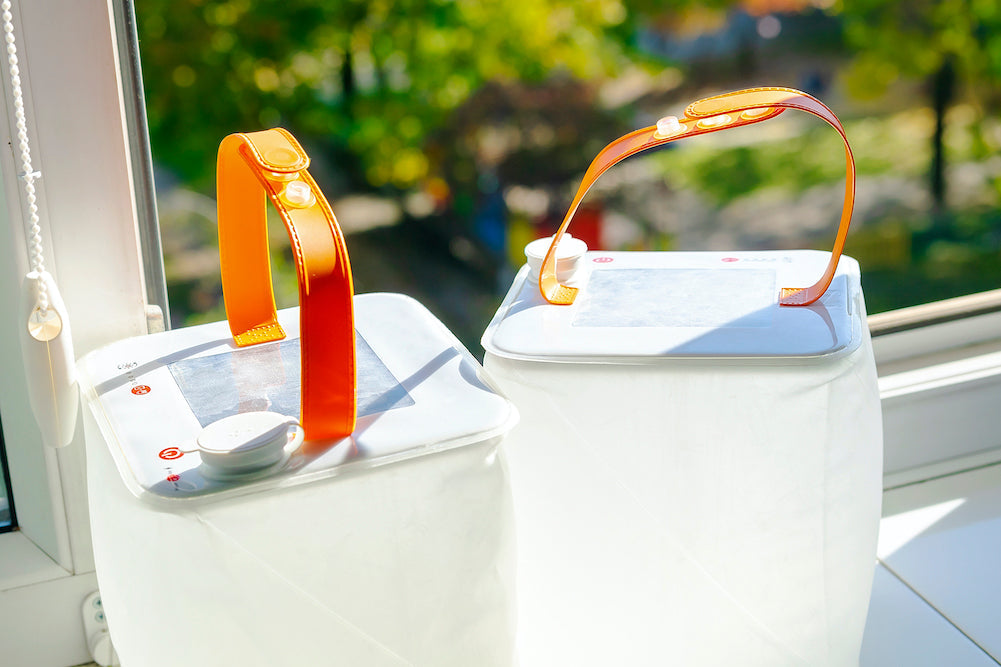Access to safe and reliable lighting is a luxury for many, LuminAID stands out as a beacon of hope. This innovative company provides sustainable solar-powered lighting solutions that make a difference in humanitarian aid efforts and enhance outdoor adventures. Let’s explore how LuminAID shines a light on a brighter, more sustainable future.
LuminAID’s Impact
LuminAID’s impact spans across regions affected by natural disasters, refugee camps, and communities lacking access to electricity. LuminAID’s solar lights improve safety and reduce health risks for individuals and communities by replacing hazardous alternatives like candles or kerosene lamps. These portable lights have been distributed in over 100 countries, providing a sustainable lighting source where it is needed most.
The “Give Light, Get Light” Program:
One of LuminAID’s notable initiatives is the “Give Light, Get Light” program. Through this program, individuals can sponsor solar lights for distribution to families in need. The program has successfully sent over 50,000 solar lights to those without stable electricity access. It’s an opportunity for people to directly impact the lives of others by providing them with reliable and sustainable lighting, offering a glimmer of hope in challenging situations.
Versatility for Outdoor Adventures
LuminAID lights are not just limited to humanitarian aid but also perfect companions for outdoor enthusiasts. Whether you’re camping, hiking, or simply enjoying the great outdoors, LuminAID’s solar lights provide a lightweight and portable lighting solution. Their compact design and durability make them ideal for illuminating campsites, trails or creating a cozy ambiance during nighttime adventures. Say goodbye to disposable batteries and embrace sustainable lighting on your outdoor escapades.
LuminAID’s Sustainable Approach
LuminAID takes sustainability seriously, reflecting in their product design and functionality. These solar lights harness the sun’s power, eliminating the need for disposable batteries or grid electricity. LuminAID lights offer a renewable and environmentally friendly lighting solution with rechargeable batteries and built-in solar panels. Using their lights reduces carbon emissions and minimizes waste, contributing to a more sustainable future.
Final Thoughts
LuminAID is more than just a company; it’s a beacon of light for those in need and an inspiration for sustainable living. Through their innovative solar-powered lighting solutions, LuminAID brings safety, comfort, and hope to communities affected by disasters and individuals exploring the outdoors. By supporting LuminAID, you become a part of their mission to make safe light accessible to all, driving positive change in humanitarian aid and sustainable living practices.
Embrace LuminAID’s sustainable lighting solutions and help illuminate a brighter future for everyone. Whether you’re camping under the stars or reaching out to those in need, let LuminAID be your guiding light toward a more sustainable and compassionate world.
Related Topic:
Shining Light on Sustainability: How Solar-Powered Lights Reduce Energy Waste, Save Money, and Benefit the Environment
Finding energy-efficient solutions is essential in an era where sustainability and environmental consciousness are paramount. One such solution is solar-powered lights, which reduce energy waste and offer cost savings and environmental benefits. In this blog post, we will explore how solar-powered lights harness the power of the sun, their energy efficiency, the resulting cost savings, and their positive impact on the environment.
Energy Efficiency and Waste Reduction
Solar-powered lights operate by harnessing the abundant energy of the sun. The photovoltaic panels in these lights convert sunlight into electricity, eliminating the need for traditional power sources. One key factor contributing to their energy efficiency is using Light Emitting Diode (LED) technology. LEDs are highly efficient, converting a significant portion of their energy into light rather than heat. Compared to traditional incandescent or fluorescent lights, LEDs consume less electricity for the same light output, reducing energy waste.
Moreover, solar-powered lights offer the advantage of off-grid capability. They generate and store electricity during the day, relying on rechargeable batteries to power the lights at night or during cloudy periods. This self-sufficiency eliminates the need for additional energy transmission and distribution infrastructure, reducing energy losses that occur during long-distance electricity transport.
Cost Savings and Financial Benefits
One of the most compelling reasons to switch to solar-powered lights is the potential for cost savings. Although the upfront investment in solar lights may be higher than traditional lighting options, the long-term financial benefits are significant. By utilizing solar energy, households can substantially reduce their electricity bills. Solar-powered lights draw energy directly from the sun, eliminating the need for electricity from the grid. As a result, households can experience substantial savings over time, especially if they use solar lights extensively or have a large outdoor lighting setup.
Another factor contributing to cost savings is the long lifespan of solar-powered lights. LEDs used in solar lights have a significantly longer lifespan compared to traditional lighting technologies. LED lights can last for tens of thousands of hours, reducing the need for frequent replacements and the associated costs. Additionally, solar lights require minimal maintenance since they do not have complex electrical components and do not need to be connected to the grid. These low maintenance requirements further contribute to long-term cost savings.
In addition to reduced energy costs, solar-powered lights offer financial incentives in certain regions. Net metering is a program that allows homeowners to feed excess solar electricity back into the grid, offsetting their energy usage at night or during cloudy periods. This reduces the reliance on the grid and can result in financial benefits, such as receiving credits or payments for the surplus energy produced. Feed-in tariffs are another incentive mechanism where homeowners can sell their surplus solar electricity back to the grid at a predetermined rate. These financial incentives make solar-powered lights an even more attractive and cost-effective option for households.
Environmental Benefits
The environmental benefits of solar-powered lights are substantial. Solar energy is a clean and renewable source of power, contributing to a significant reduction in greenhouse gas emissions. Unlike traditional electricity generation methods that rely on fossil fuels, solar-powered lights produce electricity without emitting any greenhouse gases during operation. Solar-powered lights play a vital role in mitigating climate change and preserving the environment by reducing reliance on fossil fuels and associated emissions.
Solar lights also have a minimal impact on air pollution. Fossil fuel-based power generation releases pollutants such as sulfur dioxide, nitrogen oxides, and particulate matter into the atmosphere, leading to air pollution and adverse health effects. Solar-powered lights, on the other hand, do not emit any pollutants during their operation, which helps improve air quality and reduce respiratory illnesses. By choosing solar-powered lights, you actively contribute to cleaner air and a healthier environment for both yourself and your community.
Furthermore, solar-powered lights have a minimal ecological impact compared to conventional lighting options. The extraction, transportation, and combustion of fossil fuels have significant environmental consequences, including habitat destruction, ecosystem disruption, and oil spills. Solar power generation, on the other hand, has a much smaller ecological footprint. By using solar-powered lights, you contribute to the preservation of ecosystems and the protection of biodiversity.
In addition to reducing pollution and conserving resources, solar-powered lights also contribute to water conservation. Traditional electricity generation methods, such as coal-fired power plants, consume vast amounts of water for cooling and steam production. This high water usage puts pressure on freshwater sources and ecosystems. In contrast, solar-powered lights do not require water for their operation, helping to conserve this precious resource and reduce the strain on water supplies.
Social and Ethical Considerations
Solar-powered lights have social and ethical implications that go beyond environmental benefits. Access to electricity is essential for societal development, yet many communities, especially in remote or underserved areas, lack reliable access to electricity grids. Solar-powered lights provide an opportunity for energy access and empowerment in these regions. By utilizing solar energy, communities can meet their lighting needs, improve safety, extend student study hours, and enhance the overall quality of life.
Furthermore, solar-powered lights contribute to energy independence. By generating their own electricity, households, and communities reduce their dependence on centralized power sources and potentially volatile energy markets. Solar-powered lights offer a reliable, decentralized energy solution that promotes self-sufficiency and resilience, especially during power outages or disruptions.
Ethical considerations extend to the supply chain of solar-powered lights as well. The industry is working towards responsible sourcing of materials, fair labor practices, and sustainable manufacturing processes. By choosing reputable manufacturers and suppliers that prioritize ethical practices, you can ensure that the solar-powered lights you use align with your values.
Final Thoughts
Solar-powered lights are a sustainable and environmentally conscious choice for households. They reduce energy waste through efficient LED technology, save money through reduced electricity bills and long lifespan, and benefit the environment by reducing greenhouse gas emissions, air pollution, and water consumption. Moreover, solar-powered lights provide social and ethical benefits by offering energy access, fostering energy independence, and contributing to a responsible supply chain.
By embracing solar-powered lights, you actively create a greener and more sustainable future. So, shine a light on sustainability and switch to solar-powered lights for a brighter, more environmentally friendly world.









Reader Interactions